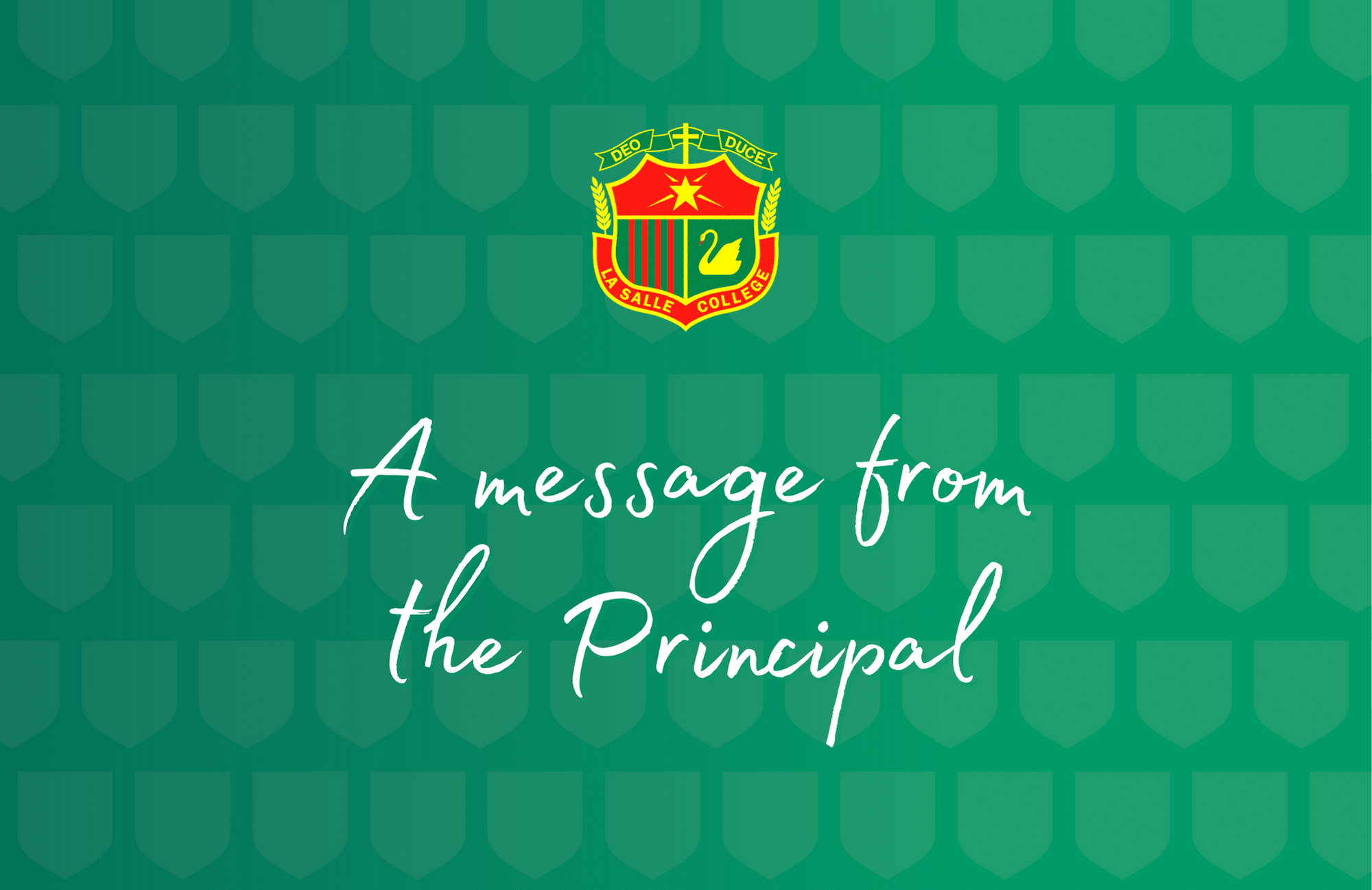Dear families and friends, welcome back to Term 2! A particularly warm welcome to our new families and staff who have joined our Lasallian community this term.
The events of the last few weeks have certainly been challenging for all members in our community. I am aware that the uncertainties of this time can cause distress for children and their families. As a College the wellbeing of our students has always been a priority.
The World Health Organisation defines wellbeing as “the state in which an individual realises his or her own abilities, can cope with normal stresses of life, can work productively, and is able to make a contribution to his or her own community”. Wellbeing involves having positive self image and self esteem.
Resilience, which is directly related to wellbeing, is about having the ability to cope with and adapt to new situations. Having a sense of resilience and positive wellbeing enables a person to approach other people and situations with confidence and optimism, which is especially important for young people given the enormous changes that occur with the transition into adolescence and adulthood.
This term we enter into what many would consider to be the ‘pointy’ end of the semester with our students preparing and engaging in NAPLAN tests for Numeracy and Literacy, Senior School Exams and Year 12 Externally Set tasks. I would like to reflect on the important way parents can support their children in developing their resilience.
In a practical sense, developing and improving on setting realistic and achievable goals, problem solving and social skills all contribute to our wellbeing and resiliency. Other important skills include identifying and becoming aware of one’s own strengths and weaknesses.
- Setting realistic, achievable and measurable goals is a great way to promote self-efficacy. Setting goals should be motivating. One way to increase motivation (and minimise feeling pressure or ‘failure’) is to set sub-goals, smaller and achievable related targets.
- Understanding and avoiding negative self-talk as well as actively practicing positive self-talk, is an important tool for building self-esteem. Self-talk, which is essentially internal reflections on personal ability and/or image, can greatly influence self esteem and perceptions about personal ability.
- Developing and focusing on interpersonal skills, especially learning how to engage with people from different backgrounds, is a valuable tool for young people that will enhance self esteem and ability to maintain personal and fulfilling relationships.
As parents, the following recommendations from Kids Helpline, may assist you in supporting the development of your child’s wellbeing and growth.
Let your child make mistakes
By having to overcome normal challenges for their age and understanding that no one is perfect, your child will learn how to bounce back and be more resourceful. By over-protecting your child and doing things for them, you deny your child important opportunities for developing resilience.
Don’t fight your child’s battles
Sorting out conflicts with friends and peers are important skills for healthy social relationships.
Encourage your child to talk about things that are bothering them
Learning to seek help when a problem cannot be solved is an important lifelong skill. Let your child know that unhappy or difficult times are a normal part of life and don’t usually last for long.
Encourage your child to re-phrase unhelpful comments
Teach your child to turn words such as – I’m stupid or She hates me into more helpful and optimistic comments – I made a mistake, everyone makes mistakes or She doesn’t hate me she just feels like sitting with someone else today.
Taking responsibility
Encourage your child to take responsibility for the things they have or haven’t done that may have contributed to an unhappy situation or setback.
Help your child to understand the role that ‘bad luck’ and the role that others may have played when they are faced with an unhappy situation or setback.
Be a positive role model for your child
- Talk your problems through with others and look for different solutions
- Use optimistic thinking and say things out loud, such as – things will get better soon
- Talk about how you may have managed strong emotions in a calm way
- Talk about your goals and how you hope to achieve them
- Show appreciation to others for their friendship.
Thank you for playing a vital role in your child’s resilience and wellbeing education.
Let us continue to pray for the many less fortunate communities around our world, that they may find fortitude in dealing with the adversities they are facing, and that the support for their communities will be a source of hope and courage.
Yours sincerely,
Ms Giovanna Fiume | Principal




